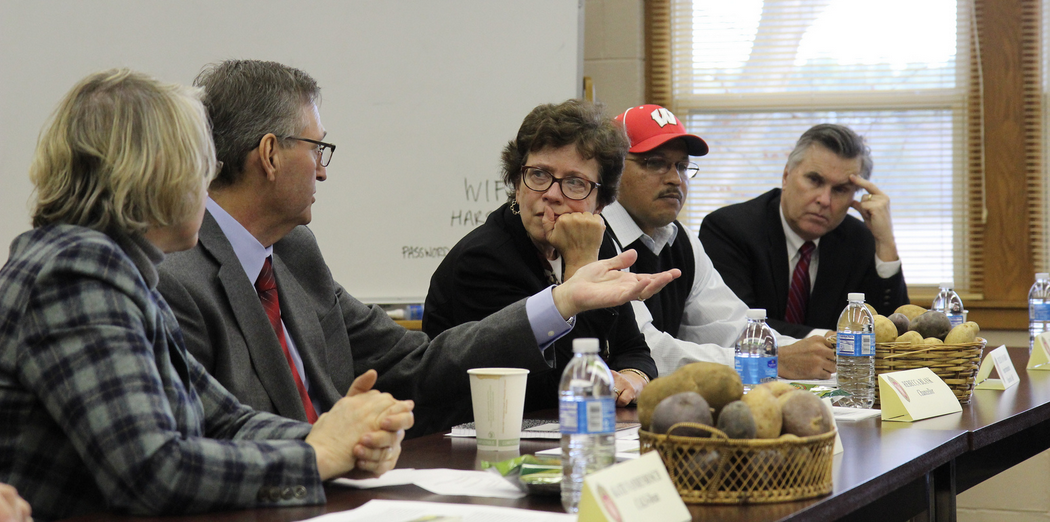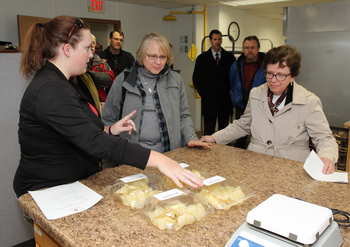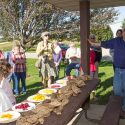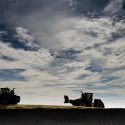Hancock ag station partners with industry to boost vegetable growers

Chancellor Rebecca Blank listens to Duane Maatz, executive director of the Wisconsin Potato and Vegetable Growers Association, during a stakeholder briefing at the Hancock Agricultural Research Station. Seated left to right are CALS Dean Kate VandenBosch, Maatz, Blank, Felix Navarro, station superintendent, and Vice Chancellor for University Relations Vince Sweeney.
Photos: Sevie Kenyon
The research advances at UW–Madison’s Hancock Agricultural Research Station are keeping vegetable growers on the cutting edge of the industry, producers told Chancellor Rebecca Blank during a tour of the facility Tuesday.
Blank met with more than two dozen local vegetable growers and industry professionals at the research station.
“I was delighted to hear about the partnership between the university and the vegetable growing industry that takes place at the Hancock Agricultural Research Station,” Blank says. “We had a wonderful conversation about the ways agricultural research is used on a daily basis. That is the type of outreach that the University of Wisconsin–Madison does with businesses across the state.”
The tour is part of Blank’s ongoing outreach mission across Wisconsin. During this swing through the central part of the state, Blank also visited with UW-Stevens Point Provost Greg Summers, met with alumni and local media, business leaders and legislators in Wausau, and toured the UW School of Medicine and Public Health’s Medical Education campus in Marshfield.

Research specialist Amber Gotch (left) explains potato chip research to Dean VandenBosch and Chancellor Blank.
Research at Hancock focuses on irrigated vegetable and field crops. Potatoes, snap beans, cucumbers, field corn, sweet corn and carrots are studied at the facility.
Felix Navarro, superintendent of the research station, says there is a huge demand among Wisconsin potato processors, who make the spuds into chips and fries, to have the vegetables available after May. Traditionally, Wisconsin growers are sold out of their crop by late April or early May, and processors here have gone to southern states to acquire potatoes before their next crop is ready.
“If you bring potatoes from the south you have to use more fuel, which is a sustainability concern, and your economies go down because your costs are higher. At the same time, the (northern) growers will be losing the opportunity to make additional dollars,” Navarro says.
The research at Hancock has allowed growers to store potatoes for longer periods of time without losing quality.
“We contribute to the economy. All of that knowledge comes out of stations like the Hancock Agricultural Research Station and research the university does with growers right in their own fields,” Navarro says.
Blank toured the potato storage research facility, which features nine bulk storage bins that can hold 200,000 pounds of potatoes each. The research at the facility helps improve the quality and safety of stored product, says A. J. Bussan, professor of horticulture.
“The research at the university and the research station keeps us as leaders in the industry in terms of sustainability and in the concern we have for the environment.”
Larry Alsum
UW–Madison researchers are leading a $3.7 million USDA Specialty Crop Research Initiative to reduce the amount of acrylamide in processed potatoes without sacrificing taste or texture. Acrylamide is potential carcinogen found in starchy foods cooked at high temperatures.
“Storage conditions have an impact on acrylamide,” Bussan says. “We help the growers to deliver their products into the marketplace more successfully, with higher quality and better safety of stored product. This facility has been identified as one of the best institutions for that.”
The storage facility is just one of many ways that research at the College of Agricultural and Life Sciences (CALS) is benefitting farmers in the Central Wisconsin region.
To Larry Alsum, president and CEO of Alsum Farms & Produce in Friesland, the most important research is in the area of water use and conservation. The college is in the midst of a study of the impact of irrigation pumping on the region’s ground and surface water supplies. Called the Central Sands Water Initiative, the study brings together a broad coalition of stakeholders, including farmers, the Wisconsin Potato and Vegetable Growers Association, scientists and local lake and environmental groups.
“As growers, we recognize how important water is,” Alsum says. “We need irrigation during critical months, and we’re committed to working with the university on science-based solutions.”
Alsum says he visits the research station as many as six times a year to learn about the latest research and developments. He said he also looks to the research at the station to discover new potato varieties.
“The need to innovate is absolutely critical for economic growth in our industry,” Alsum says.
“The research at the university and the research station keeps us (Wisconsin growers) as leaders in the industry in terms of sustainability and in the concern we have for the environment,” he says.
Subscribe to Wisconsin Ideas
Want more stories of the Wisconsin Idea in action? Sign-up for our monthly e-newsletter highlighting how Badgers are taking their education and research beyond the boundaries of the classroom to improve lives.



